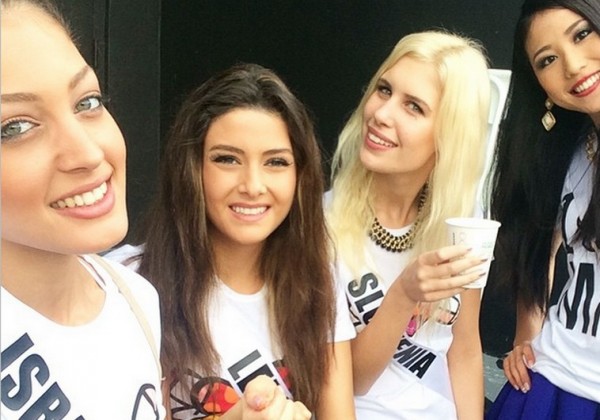
Pageants, despite the contestants’ rhetoric about world peace, are actually fraught with international conflict – as the latest Miss Universe controversy shows. Being a political scientist and a former international beauty queen, I know that in pageantry, as in politics, nothing is what it seems. Beneath the layers of deftly applied make-up and spray tan, international pageants are as wrought with political turmoil as any high-profile diplomatic event.
Take, for instance, the latest conflict in the Middle East. A selfie taken by the Israeli contestant at the Miss Universe pageant in Miami has divided observers: those who believe that Miss Israel photobombed Miss Lebanon, and those who are convinced that Miss Lebanon appeared willingly in the selfie. This recent controversy barely scratches the surface of the depth of global politics at work in such international competitions.
Believe it or not, these are political events. Akin to an annual summit of world leaders, beauty queens cum diplomats represent their countries on the world stage. They must embody their culture through the national costume competition, answer questions from an international press corps, and all the while look fabulous in a bikini.
The political significance of pageants isn’t trivial. They have served as flashpoints for devastating political violence. A boycott of the 2002 Miss World pageant was launched by contestants in response to human rights violations, including a death sentence for a single mother, in the host country Nigeria. In the end, the pageant was disrupted by riots and relocated to London. More than 100 Nigerians died.
Pageants have also been used to bring attention to important issues ranging from women’s education to domestic violence and injuries from landmines. They have been lauded for elevating women from ethnic minorities to national prominence.Miss Earth, the pageant that I won, is dedicated to bringing attention to environmental degradation and fighting climate change.
As the selfie incident makes clear, pageants take place in a broader international context. I criticised last year’s Miss Universe competition in Russia for excluding countries that Russia doesn’t recognise, and for failing to include African contestants in official press events. An American host also pulled out of the event in protest against Russia’s anti-gay legislation. While these issues were specific to Russia, the pageant served to bring them to the world stage.
Contestants also serve as the public face for many small countries. For countries that don’t hold a meaningful place at international bargaining tables, events such as Miss Universe allow them to project an image to the global public. Typically, this is about attracting tourism – but it can have greater salience. For countries such as Israel or Kosovo, fielding a Miss in an international pageant serves to reinforce a contested statehood. For example, controversy erupted in Serbia in 2011 after Miss Serbia posed for a photo with Miss Kosovo.

Miss Universe is no stranger to the tension that pervades daily life in the Middle East. The 2006 Miss Universe competition aired in the middle of the July war – the second Lebanon war – during which the Israeli attempt to eradicate Hezbollah led to 34 days of air strikes on Lebanese territory and resulted in at least 1,109 Lebanese and 160 Israeli deaths. The latter included 43 Israeli civilians and 12 soldiers killed in Hezbollah rocket attacks on Israel.
The stress of the 2006 conflict was visible in both Miss Lebanon and Miss Israel. International media reports suggested that they bonded over a shared concern for their loved ones. However, subsequent interviews suggested that this was largely media speculation. After all, in 1993 attempts at individual-level reconciliation led to a Miss Lebanon being stripped of her title for fraternising with a Miss Israel.
Events such as Miss Universe, and the international controversies that surround them, give a human face to the complex nature of global politics. If pageants are about world peace, then that peace is rooted in how two women, from countries often at war, relate to one another.
In the case of Lebanon, the idea that a single person could represent the diversity of the country is a way of publicly projecting the best aspirations of Lebanon’s democracy. The country remains deeply divided along ethnic lines. Symbols such as Miss Lebanon help sustain the fragile ethno-political balance of the country. Pageants may not directly affect diplomatic relations, but they do show just how hard it can be for individuals to escape the constraints of their political context.
The Guardian

Leave a Reply
You must be logged in to post a comment.